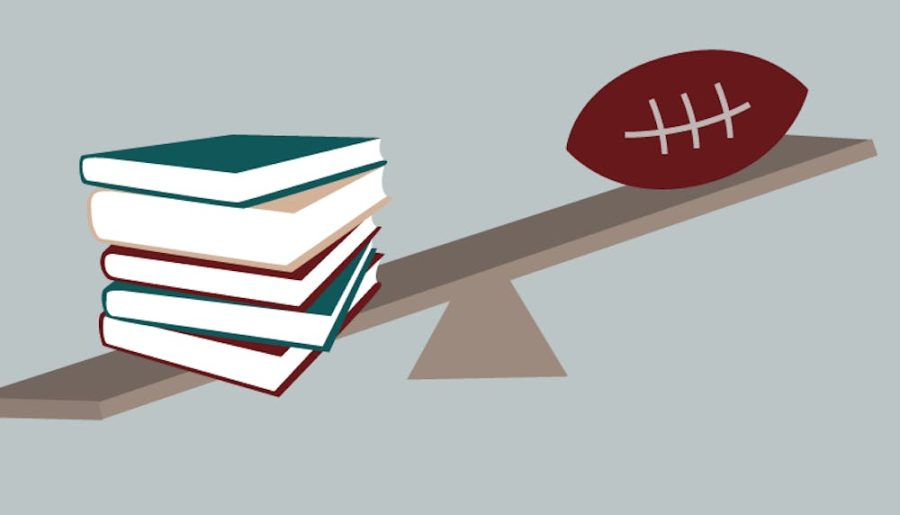Does society and peer pressure affect student-athletes’ view on their studies?
The balance between sports and academics is a hard job for student-athletes.
September 30, 2022
The grading system across the world determines the traction of most students’ lives after high school. Whether you have an A or an F, a 4 or a 1 or maybe you go to a school where they don’t use grades, the importance of grades have been implanted in our minds since the beginning of our school careers. Extracurriculars such as sports normally have a minimum grade level in order to participate such as a 2.0 or a 2.5, making about a C letter average. When it comes to star athletes or athletes in general, it seems like the ideal of sports taking precedence over grades or the standard of trying to strive for the best grades which is preached to the rest of the student body is an unpopular idea, especially portrayed in the media or around athletes everyday.
In the 1950s,the NCAA made the term student-athlete. This was used to get out of paying workers compensation to injured athletes but now decades later, the term is still in use for most students within the school system. In the process of getting recruited for college or even being able to participate in sports, athletes are generally required to uphold a certain grade point average unless to be eligible. Yet in a 1993 study by Maloney and McCormick at Clemson University it was found that athletes do three-tenths of a grade point worse than regular students in three out of ten of their classes.
It is known that upholding grades and still performing well academically can be a challenge, since time-management between practices, tests, homework and projects takes consistency and dedication, but it can be seen that for some students the student part of student athlete falls away when it comes to school. While the school might try to still hold the individual accountable, the student themselves still might not decide to and think that they have sports to back them up instead. “I think they try to hold everybody to the same accountability, because if you don’t have good grades as a student athlete, you most definitely cannot play. They might make some more stuff work just because they do know you’re a student athlete rather than a regular athlete. Because as a student athlete, you have to juggle more,” quotes Morgan Graves in an interview.
However it has been studied that this mentality shown in some athletes can be attributed to psychological factors. It is a phenomenon that is called pluralistic ignorance. Pluralistic ignorance is defined as a phenomenon that occurs when people mistakenly believe that everyone else holds a different opinion from their own. A Time.com article by Zocalo Public Square states, “Tight-knit student athletes will seek ways of fitting into a culture that they perceive as neglecting academics (by defaulting into majors of dubious merit and spending less time doing homework), knowing that their habits are observed by teammates. When their teammates observe those habits, it reaffirms the (false) conviction that caring about academics is an unfortunate aberration, best suppressed.”
The same Time.com article by Zocalo Public Square additionally pointed out that academic achievements are rarely seen for student-athletes as only their athletic achievements get the spotlight and recognition. Why wouldn’t athletes want to shift their main focus to the achievements and the values that have been shown as most valuable in the media and at universities? Colleges most commonly offer scholarships in the area of athletics and academics, but who gets the most perks and the most advantages long term at these universities? While these circumstances are not the athletes fault, it is no wonder that the balance is tipped in favor of sports instead of academics. In a direct quote from NCAA.org, “Student-athletes receive academic support, such as state-of-the-art technology and tutoring, and have access to athlete-focused academic advisors in addition to traditional academic advisors.” Perks that even students who are attending college for academic scholarships or advanced academic skills can not attain even if they wanted to.
Regardless of the academic perks being offered to student-athletes this doesn’t stop the interference of harmful ideas about academics not being important to the average student-athlete being carried even into college. Over 20 schools were investigated by the NCAA in 2015 for academic fraud, such as creating “no show” classes for their student athletes or allowing students who may not be eligible for the season due to grades, be allowed on the field regardless of the circumstances. These occurrences only confirm damaging ideas about academic integrity and the importance of school to academic athletes when these examples are being shown around them and condoned.
Athletes reflection on their grades is negatively affected by their peers and what the world around them shows when it comes to the topic. This is shown by pluralistic ignorance, causing athletes to think simply because they think about their grades highly and want to achieve, they are not allowed to do so due to the negative mass opinion of their peers and teammates not seeing academics on the same level of importance as their athletic goals. Furthermore, big sports associations such as the NCAA or big time colleges and universities continue to only praise students based on their athletic achievements, ignoring academics and igniting scandals such as “no-show” classes continuing the problems and negative mentality of student-athletes starting from high school.
These mentalities continue to disadvantage our student-athletes and are the reason why some end up without any career path or goals outside of their sport. This is detrimental and devastating as part of the problem isn’t even the athletes but is actually the fact that this mindset has been the most influential or maybe the only mindset in their life, eventually becoming a lifestyle they can’t escape. Continuing this trend in our professional and personal lives, creates a negative, harmful and eventually inescapable reality for our student athletes.







